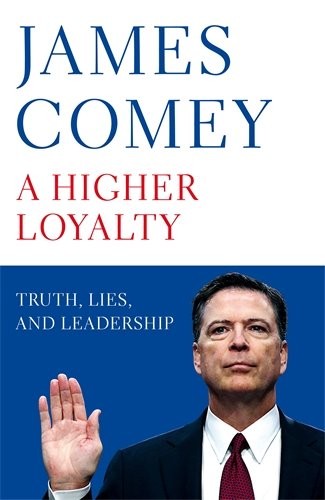Review of 'A Higher Loyalty: Truth, Lies, and Leadership' on 'Goodreads'
2 stars
My impression of James Comey as a man is at odds with my impression of this book of his.
Comey worked as General Counsel for Lockheed Martin at the same time I participated in their Leadership Development program, so I heard his keynote to us in 2010 as he was preparing to leave for Bridgewater. His speech's clarity and structure impressed me, and he gave us practical advice. His writing style sounds like the innocently principled prose of former President Jimmy Carter, but unlike Carter, deliberately prefaces his version of each event with stories of how honorable and bipartisan he is, even explicitly drawing parallels to George Washington.
After spending most of the book emphasizing how critical it is to have good leaders, Comey says he's sure the country will be fine with a bad leader, and that we'll become stronger as a country because of it. I think this …
My impression of James Comey as a man is at odds with my impression of this book of his.
Comey worked as General Counsel for Lockheed Martin at the same time I participated in their Leadership Development program, so I heard his keynote to us in 2010 as he was preparing to leave for Bridgewater. His speech's clarity and structure impressed me, and he gave us practical advice. His writing style sounds like the innocently principled prose of former President Jimmy Carter, but unlike Carter, deliberately prefaces his version of each event with stories of how honorable and bipartisan he is, even explicitly drawing parallels to George Washington.
After spending most of the book emphasizing how critical it is to have good leaders, Comey says he's sure the country will be fine with a bad leader, and that we'll become stronger as a country because of it. I think this jarring inconsistency in his worldview is ego protection, allowing him to disown responsibility for the consequences of his actions.
In the end, his argument appears to be that "good" people acting with "good" intentions can't possibly cause anything but "good" outcomes. That in fact, the consequences are irrelevant to people who act from their principles. In the best light, he appears to be invoking the modern Christian attitude of fatalism that "God is in control" or that it'll all turn out right in the end, even if that end is the apocalypse.
This book adds very little additional information to current events and little value to leadership training, management, or political theory. It comes across as a dissembling cover-your-ass, and possibly a way of cashing in on media attention.


